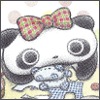
Every time some book that is not particularly well-crafted, objectively, has a huge amount of financial success, there are writers who will say "It's all random! It's all marketing!"
I think it's really not.
When I read Twilight (and I HATE to use that as an example because so much of the criticism about it is wrapped up in "Is it feminist to hate a book that normalizes abusive relationships, or is it misogynistic to hate a book that's widely loved by teenage girls without regard to their own agency and ability to read books critically?" but I don't often read megabestsellers so that's what I've got) I had that sense, of "You know, there are a lot of levels on which this doesn't work for me, but it IS sort of unputdownable." I'm not sure if this was before the second book came out, but it was certainly long before Twilight had become a THING, and I didn't come at it as a megabestseller; I came at it like any other book.
I have to say, that compelling quality isn't all that common. There are lots of very good books I read that don't have it. I think part of it is a smooth, transparent prose style, and part of it is exciting or wish-fulfillmenty things happening, and part of it is just some deep kind of magic.
It's okay to admit that beautiful writing is not a high priority for lots of readers. That doesn't mean that people aren't quite skilled at picking out books that are going to make them happy. A great book is not always a book that everybody wants to read, and that's okay too.
(Writing rant #90 is against people who say "Well, if X is so great, why doesn't she have a SOLID GOLD HOUSE, she must write pretentious crap." The key in these discussions, by the way, is that one should assume that any writing less populist than one's own is pretentious crap, and any writing more populist than one's own is commercial trash.)